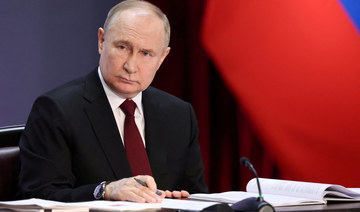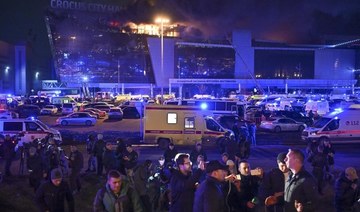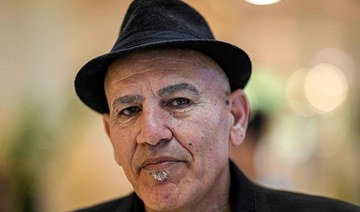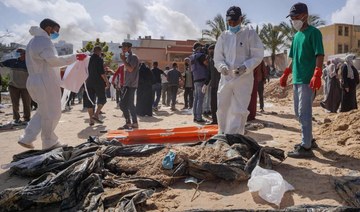SYDNEY: Up to 20,000 protesters rallied in Sydney on Wednesday demanding urgent climate action from Australia’s government, as bushfire smoke choking the city caused health problems to spike.
Sydney has endured weeks bathed in toxic smoke as hundreds of blazes have raged across the countryside, with hospitals recording a 25 percent increase in the number of people visiting emergency departments last week.
On Tuesday smoke alarms rang out across Australia’s biggest city, with thick haze triggering smoke alarms and forcing buildings to be evacuated, school children to be kept indoors, and ferries to be canceled.
The devastating fires have focused attention on climate change, with scientists saying the blazes have come earlier and with more intensity than usual due to global warming and a prolonged drought.
Police estimated the crowd size at 15,000, organizers put the figure at 20,000.
Many of the protesters voiced anger at the government’s silence in the face of the crisis.
“The country is on fire” said 26-year-old Samuel Wilkie attending his first climate protest. He described politicians’ response as “pathetic.”
“Our government is not doing anything about it,” said 29-year-old landscape gardener Zara Zoe. “No one is listening, no one is doing anything.”
Prime Minister Scott Morrison — a staunch backer of Australia’s vast coal industry — has said little about the smoke since the crisis began, preferring to focus on fire-hit rural communities.
Organizer Chloe Rafferty said that had created anger at the conservative government’s inaction.
“I think the wider public can see that we are not expecting the climate crisis in the future but we are facing the climate crisis now,” she told AFP.
“People are experiencing it in their day-to-day lives.”
As well as a rise in people visiting hospitals with smoke-related health symptoms, the number of emergency calls for ambulances spiked 30 percent last week.
“For most people, smoke causes mild symptoms like sore eyes, nose and throat,” top health department official Richard Broome said.
“However, people with conditions like asthma, emphysema and angina are at greater risk because the smoke can trigger their symptoms.”
Smoke from bushfires is one of the biggest contributors to air pollution in Australia, releasing fine particles that can lodge deep within people’s lungs and cause
“severe” health impacts over time, according to scientist Mick Meyer from government-funded scientific research agency CSIRO.
“The impact of smoke on people remote from the fires may, on occasion, substantially exceed the direct injury to people within the fire zone,” he wrote in The Conversation.
“But we currently lack the operational tools to understand the extent of these impacts or to manage them.”
Six people have been killed and more than 700 houses destroyed in bushfires this fire season.
Though the human toll has been far lower than the deadliest fire season in 2009 — when almost 200 people died — the scale of this year’s devastation has been widely described as unprecedented.
Three million hectares (7.4 million acres) of land has been burnt — the size of some small countries — and vast swathes of koala habitat scorched.
Official data shows 2019 is on track to be one of the hottest and driest years on record in Australia.
Australians protest as bushfire haze sparks health fears
Australians protest as bushfire haze sparks health fears
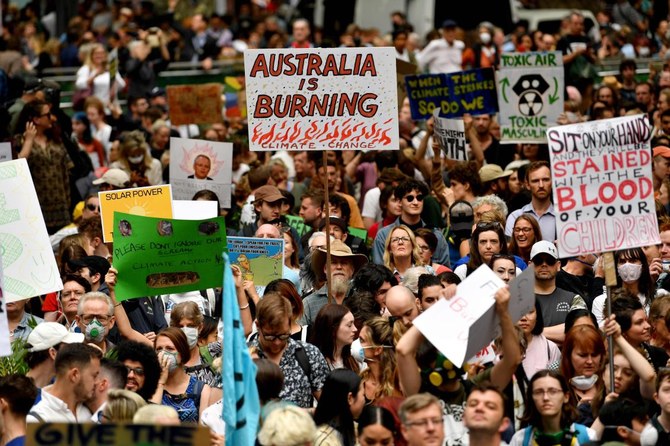
- Many of the protesters voiced anger at the government’s silence in the face of the crisis
- Police estimated the crowd size at 15,000, organizers put the figure at 20,000
Britain’s home secretary touts UK-Rwanda migrant deportation deal during visit to Italy
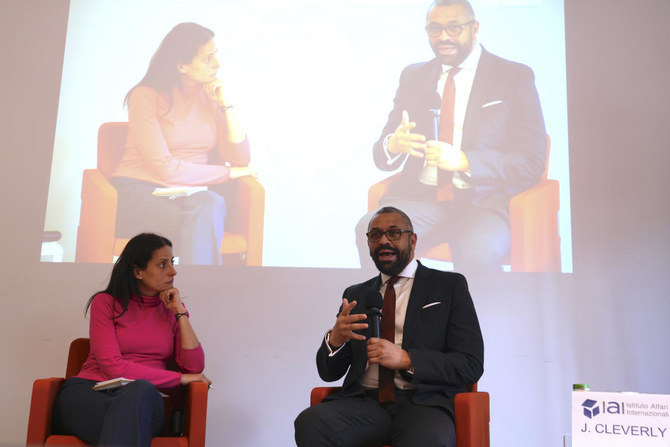
- Deal, in which Britain will pay Rwanda to process the migrants, is aimed at deterring people from crossing the English Channel from France
- It is similar in some basic aspects to Italy’s controversial pact to outsource the processing of asylum-seekers to Italian-run centers in Albania
Home Secretary James Cleverly visited Italy, ground zero in Europe’s migration debate, hours after the UK Parliament approved legislation to enable the government to deport some people to Rwanda who enter Britain illegally.
The deal, in which Britain will pay Rwanda to process the migrants, is aimed at deterring people from crossing the English Channel from France. It is similar in some basic aspects to Italy’s controversial pact to outsource the processing of asylum-seekers to Italian-run centers in Albania.
Human rights groups have said both deals, forged by conservative governments amid anti-migrant sentiment among voters, violate the rights of migrants that are enshrined in international refugee conventions.
On Tuesday, the UN High Commissioner for Refugees said the UK-Rwanda deal is “not compatible with international refugee law” because it uses an asylum model “that undermines global solidarity and the established international refugee protection system.”
Cleverly defended the deal as a necessary response to a problem that has outgrown the international institutional way of processing migrants. He said Britain will not tolerate people smugglers determining who arrives on British soil.
“People-smuggling mass migration has changed (and) I think demands us to be constantly innovating,” he told a gathering at the Institute of International Affairs, a Rome-based think tank.
He said he took seriously the UNCHR criticism and said Britain was a law-abiding country.
“Of course we will respect the UN enormously,” he said when asked about the UNHCR criticism. “We take it very, very seriously. Doesn’t mean to say we always agree with their assessment. But we will, of course, look at that.”
Cleverly visited the Italian coast guard headquarters on Tuesday and on Wednesday is to visit the Sicilian island of Lampedusa, where tens of thousands of migrants have arrived after crossing the Mediterranean Sea on boats setting off from northern Africa.
Lampedusa is closer to Africa than the Italian mainland and is often the destination of choice for migrants, whose numbers reached 157,652 new arrivals in Italy last year.
The numbers arriving in Italy so far this year are actually way down, presumably thanks to Italy’s European Union-endorsed agreement with Tunisia to stem departures. As of Tuesday, 16,090 migrants had arrived by sea in Italy so far this year, compared to 36,324 in this period last year.
Spain has actually outpaced Italy so far this year in terms of migrant sea arrivals, with 16,621 arriving this year as of April 15, the last available date.
In Britain, the numbers pale in comparison to the southern Mediterranean, even during peak periods: In 2022, the number of people arriving in Britain from across the Channel reached 45,774, though last year the number dropped to 29,437.
Ukraine suspends consular services abroad for men of fighting age

- Ukraine’s foreign affairs ministry “announced a temporary suspension of accepting new applications for consular services” for men between 18 and 60
- It made an exception for documents allowing Ukrainians to return to Ukraine
KYIV: Ukraine authorities on Tuesday suspended consular services for men of fighting age living abroad, after announcing measures to bring them home amid manpower shortages in the army fighting Russia.
Ukraine’s army has been struggling to hold frontlines, partly due to a lack of soldiers over two years into Russia’s invasion.
Ukraine’s foreign affairs ministry “announced a temporary suspension of accepting new applications for consular services” for men between 18 and 60.
It made an exception for documents allowing Ukrainians to return to Ukraine.
The move would likely oblige Ukrainian men to return from abroad to undergo administrative procedures that were previously available abroad.
The government has already adopted a mobilization law, due to come into force on May 18, that toughens penalties against draft dodgers and obliges men to keep their military registration up-to-date.
The ministry said men would be able to access consular services once the law came into force and “after updating their military registration.”
“Male citizen of Ukraine aged 18 to 60 with valid military registration documents will have full access to consular services,” the ministry said.
Ukrainian men have been forbidden to leave the country since the invasion began, apart from a few exceptions.
But some lived away before the war began, and Ukrainian media estimates that thousands more illegally fled the country.
Major arrests at NYU campus as Gaza protests spread
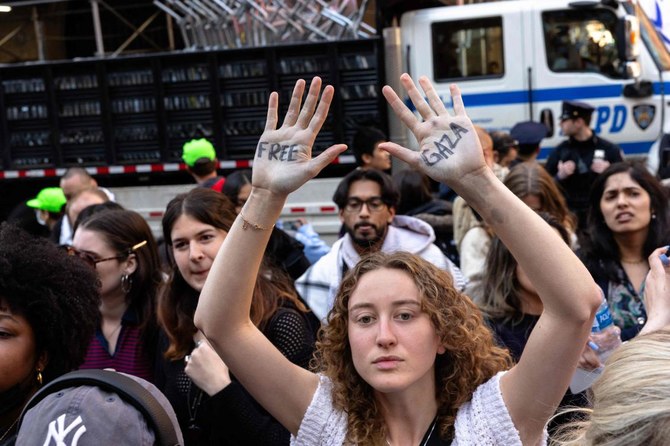
- Some of America’s most prestigious universities have been rocked by protests in recent weeks
- On Tuesday, the New York Police Department said 133 people had been arrested at NYU and released after being issued with court summons
NEW YORK: More than 130 people were arrested overnight during pro-Palestinian protests at the New York University campus, as student demonstrations gather pace in the United States over the Israel-Hamas war.
Some of America’s most prestigious universities have been rocked by protests in recent weeks as students and other agitators take over quads and disrupt campus activities.
The demonstrations come amid sweeping debates over Israel’s assault on Gaza, following Hamas’s deadly invasion on October 7.
Such bastions of higher education — Harvard, Yale, Columbia and others — are grappling for a balance between students demanding free speech rights and others who argue that campuses are encouraging intimidation and hate speech.
On Tuesday, the New York Police Department told AFP that 133 people had been arrested at NYU and released after being issued with court summons, as protests also intensify at Yale, Columbia University and other campuses.
As the holiday of Passover began Monday night, police began detaining demonstrators at an encampment at NYU who had earlier refused orders to disperse.
A New York University spokesman said the decision to call police came after additional protesters, many of whom were not thought to be affiliated with NYU, suddenly breached the barriers erected around the encampment.
This “dramatically changed” the situation, the spokesman said in a statement on the school’s website Monday, citing “disorderly, disruptive and antagonizing behavior” along with “intimidated chants and several antisemitic incidents.”
“Given the foregoing and the safety issues raised by the breach, we asked for assistance from the NYPD. The police urged those on the plaza to leave peacefully, but ultimately made a number of arrests.”
The spokesman said the school continues to support freedom of expression and the safety of students.
But protests have grown large and disruptive enough — New York Police Department spokesmen have spoken of their officers facing violence when confronting protesters at NYU — to draw the attention of President Joe Biden and his administration.
“Anti-Semitic hate on college campuses is unacceptable,” US Secretary of Education Miguel Cardona posted on X on Tuesday, expressing concern about the unrest.
The protests began last week at Columbia University, also in New York, with a large group of demonstrators establishing a so-called “Gaza Solidarity Encampment” on school grounds.
But more than 100 protesters were arrested after university authorities called the police onto Columbia’s campus Thursday, a move that seemingly escalated tensions and sparked a greater turnout over the weekend.
Social media images late Monday appeared to show pro-Palestinian Jewish students holding traditional seder meals inside the protest areas on campuses including at Columbia.
There were also demonstrations at MIT, the University of Michigan, UC Berkeley and Yale, where at least 47 people were arrested Monday after refusing requests to disperse.
France arrests eight in PKK financing probe
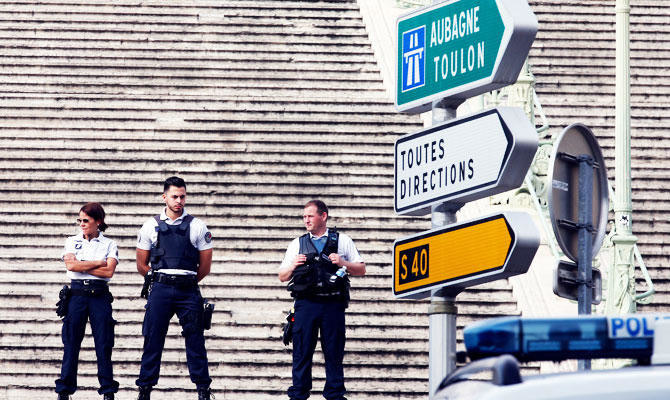
- The arrests took place in the Paris region and in southern France, the PNAT anti-terror unit said
- French prosecutors suspect the eight of preparing and financing terrorist acts
PARIS: French police arrested eight men on Tuesday as part of an investigation into the finances of the Kurdistan Workers Party (PKK), banned as a terror organization by Turkiye and its Western allies, anti-terrorism prosecutors told AFP.
The arrests took place in the Paris region and in southern France, the PNAT anti-terror unit said.
The PKK has been designated a terrorist organization by Turkiye, the United States and the European Union.
French prosecutors suspect the eight of preparing and financing terrorist acts, and of conspiring to extort, or attempt to extort, funds to finance a terrorist organistion between 2020 and 2024, the PNAT said.
Investigators believe the eight to be connected to a campaign to collect funds from Kurdish business people and other Kurds in France, a source close to the case added.
Police can hold the suspects for up to 96 hours for questioning, the source said.
Another source said the funds were destined for use in Belgium, where police on Monday raided Kurdish-run media as part of a probe undertaken at the request of a French anti-terror judge, the PNAT said.
The PKK has waged a decades-long insurgency for greater autonomy for the Kurdish minority of Turkiye in the southeast of the country, in a standoff with the Ankara government that remains unresolved to this day.
Dutch intelligence sees the wars in Gaza and Ukraine as triggers for terrorist threats

- The Israel-Hamas war in Gaza and the destruction of a Qur’an outside parliament last year are “trigger events” for extremists
- “The terrorist threat is serious at this moment,” the agency’s director-general, Erik Akerboom, told AP
ZOETERMEER, Netherlands: The Dutch national intelligence agency said Tuesday that threats targeting the Netherlands are increasingly connected to worldwide turmoil, including the wars in Gaza and Ukraine.
Although the number of terror attacks across Europe has been down in recent years, the General Intelligence and Security Service in its annual report said the Israel-Hamas war in Gaza and the destruction of a Qur’an outside parliament last year are “trigger events” for extremists.
“The terrorist threat is serious at this moment,” the agency’s director-general, Erik Akerboom, told The Associated Press.
Akerboom said he is particularly concerned about big events, noting that the agency is working closely with French authorities to prevent incidents during the Paris Olympics this summer.
In December, the Dutch counterterrorism agency increased the country’s threat alert to its second-highest level because of concerns about the Daesh group’s Khorasan affiliates, Akerboom said. IS-K, a Central Asian affiliate, was responsible for the attack at a suburban Moscow concert hall that killed at least 133 people in March.
According to the new report, “global jihadism has been the greatest terrorist threat for years in the Netherlands.” Incidents such as the one last April, when an anti-Islam activist tore pages from the Qur’an in front of the Dutch parliament building, put the Netherlands on the map of targets.
About a dozen terror attacks were thwarted by authorities in Europe last year and in four cases, suspects were arrested in the Netherlands, the report said. None of those attacks was focused on the Netherlands, according to Akerboom.
The Dutch also see threats from China, in particular cyberattacks, as a major concern. Akerboom said China is producing more hackers to break into Dutch systems than the Dutch can produce to defend them. The security service has cited China as the biggest threat to the country’s economic security.
Russia also continues to pose a risk to the Netherlands amid Moscow’s full-scale invasion of Ukraine. So-called peace protests in Amsterdam which call for the Dutch to stop sending arms to Ukraine have included demonstrators paid by Russian sources to attend and given prefabricated slogans, the security service has asserted.
The Netherlands is of particular interest to Moscow in part because of the international institutions housed here, including the International Criminal Court. The Hague-based court is investigating crimes in Ukraine and has issued arrest warrants for President Vladimir Putin and other Russians.



